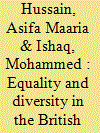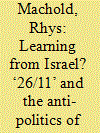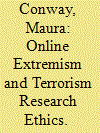|
|
|
Sort Order |
|
|
|
Items / Page
|
|
|
|
|
|
|
| Srl | Item |
| 1 |
ID:
144743


|
|
|
|
|
| Summary/Abstract |
The UK's changing political and legal landscape since 2000 reflecting transformations in wider society have elevated equality and diversity (E&D) issues to prominence in the public sector, including in the British armed forces. This research highlights key developments in the British military in relation to E&D, focusing both on areas of progress, and on the challenges still confronting the Forces. The findings reveal that the Forces have made significant strides in advancing E&D through the implementation of a range of policy initiatives but the persistence of discrimination, developments in the wider environment and the dilemmas raised by the strands of age and disability pose challenges. The value of this research is to increase our understanding of diversity management in a public sector institution that has been under-researched and views itself as “different,” and will be of interest to policymakers, E&D practitioners and academics in the field.
|
|
|
|
|
|
|
|
|
|
|
|
|
|
|
|
| 2 |
ID:
147319


|
|
|
|
|
| Summary/Abstract |
This article calls for a greater emphasis on issues of politics and anti-politics within critical debates about transnational security governance in the metropolis. While scholars have documented the growing popularity of policy ‘models’ and ‘best practices’ in policing and urban security planning, we know little about what makes these schemes attractive to the officials who enroll in them. I take the government of Maharashtra’s decision to ‘learn from Israel’ following the 2008 Mumbai attacks (26/11) as an invitation to re-evaluate the relationships among policymaking, politics, and depoliticization. Focusing on references to Israeli security know-how as a ‘best practice’ by Maharashtra state officials, I explore how an association with Israel was used to negotiate the conflicts and controversies that followed 26/11. The article has two aims: first, it addresses how transnational policy schemes work anti-politically within particular local contexts. Second, it locates counter-terrorism policy as a form of performative politics, which is generative of policy problems. In doing so, the article helps to reclaim the political contingency of policy responses to terroristic violence and addresses the agency of policy actors in the global South.
|
|
|
|
|
|
|
|
|
|
|
|
|
|
|
|
| 3 |
ID:
178923


|
|
|
|
|
| Summary/Abstract |
This article reflects on two core issues of human subjects’ research ethics and how they play out for online extremism and terrorism researchers. Medical research ethics, on which social science research ethics are based, centers the protection of research subjects, but what of the protection of researchers? Greater attention to researcher safety, including online security and privacy and mental and emotional wellbeing, is called for herein. Researching hostile or dangerous communities does not, on the other hand, exempt us from our responsibilities to protect our research subjects, which is generally ensured via informed consent. This is complicated in data-intensive research settings, especially with the former type of communities, however. Also grappled with in this article therefore are the pros and cons of waived consent and deception and the allied issue of prevention of harm to subjects in online extremism and terrorism research. The best path forward it is argued—besides talking through the diversity of ethical issues arising in online extremism and terrorism research and committing our thinking and decision-making around them to paper to a much greater extent than we have done to-date—may be development of ethics guidelines tailored to our sub-field.
|
|
|
|
|
|
|
|
|
|
|
|
|
|
|
|
|
|
|
|
|